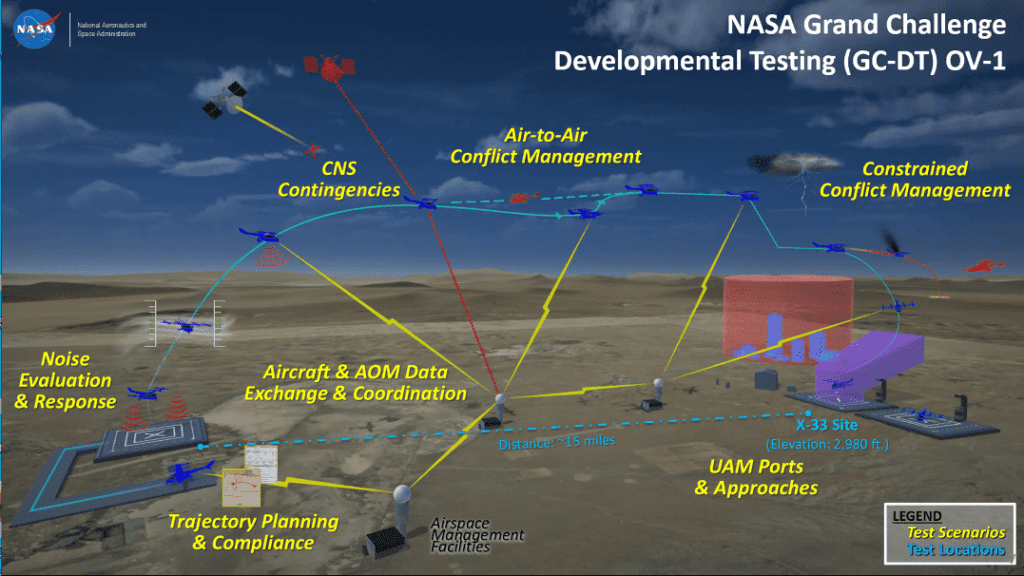
NASA signed Space Act Agreements with 17 companies as part of its UAM Grand Challenge project. (NASA)
Seventeen companies have signed Space Act Agreements with NASA to participate in the agency's first Urban Air Mobility Grand Challenge, a series of technology demonstrations meant to test the readiness of vehicles and systems intended for use in low-altitude, urban airspace.
Joby Aviation was the only company selected to provide a vehicle to fly in the initial event, termed the Grand Challenge Developmental Test (GC-DT) by NASA, set to take place later this year. GC-DT is meant as a preparatory event for the first official Grand Challenge (GC-1) event, slated for fiscal year 2022.
Five other companies – Bell, Boeing, NFT, Prodentity and Zeva – were selected to participate in the "vehicle provider information exchange," providing the agency with information about their aircraft with the intent of participating in GC-1.
Boeing, which has a number of ongoing UAM-related projects – including Uber Elevate partner Aurora, which is developing a passenger eVTOL aircraft – confirmed to Avionics International it does not intend to fly a vehicle in any future NASA UAM Grand Challenge demonstrations; its participation in the program is limited to information exchange.
"We intend to develop, evaluate, refine, and demonstrate the feasibility of a future UAM operational integration Concept of Operations," said Mildred Troegeler, director of global airspace integration at Boeing NeXT. "So [our involvement] is focused on validating our assumptions underpinning Boeing operational models, commercial use cases, and platform design requirements. It gives us greater certainty on airspace integration requirements and timeline."
"We realize that in order for the Urban Air Mobility (UAM) aircraft that we are developing to be able to fly in the future, the air traffic management system will need to evolve to include new procedures, flight rules, rules of the roads, and enabling technologies," Troegeler continued. "Our activity will help regulators and air navigation services providers to advance a joint vision on the future provision of ATM services, access to airspace, existing user engagement, and the current situation where UAS/UAM operational concept is separated from broader airspace plans."
NFT, one of the lesser-known companies collaborating with NASA, is developing a hybrid-electric drive-fly concept called ASKA, which the company claims will be capable of speeds up to 150 mph, a 350-mile range and autonomously navigate both the roads and the sky.
"ASKA is the first viable flying car that can drive on the road like a car, do VTOL, as well as STOL," Maki Kaplinsky, co-founder of NFT, told Avionics International. "We are building our prototype, and we are planning the first flight test very soon." Kaplinsky declined to clarify whether the prototype under construction was full-scale or sub-scale.
Joby, Bell and Boeing are part of Uber Elevate, the rideshare giant's UAM development ecosystem that includes Hyundai and other electric VTOL aircraft developers. Uber, which has previously participated in a number of NASA projects related to unmanned traffic management, was one of 11 companies selected as developmental airspace simulation partners to test their UAM traffic management services; others include AirMap, General Electric subsidiary AiRXOS, ANRA Technologies, ARINC, and OneSky Systems.
"Uber Elevate's Airspace Simulations will unlock when, where, and how we safely operate eVTOLs in an urban environment on the Uber platform," said Tom Prevot, director of engineering for airspace systems at Uber Elevate. "The NASA UAM Grand Challenge will allow us to put our airspace integration technologies to the test, which we are proud to do alongside our vehicle partners."
Through the Grand Challenge series, NASA intends to bring together companies involved in emerging air transportation systems to help inform requirements and best practices for UAM operations, including Federal Aviation Administration certification requirements for electric and hybrid-electric aircraft. The U.S. Air Force recently announced a similar effort – dubbed 'Agility Prime' – to engage with industry on eVTOL aircraft development and support the commercial certification process via flight testing.
"We consider this work as a risk reduction step toward Grand Challenge 1," said Starr Ginn, NASA's Grand Challenge lead. "It is designed to allow U.S. developed aircraft and airspace management service providers to essentially try out their systems with real-world operations in simulated environments that we also will be flight testing to gain experience."
The five-year Space Act Agreements signed by the 17 participating companies do not involve any exchange of funds, with both NASA and the signing parties agreeing to provide resources to accomplish testing goals.
This article has been updated with additional information from NFT, Inc, as well as Boeing.
